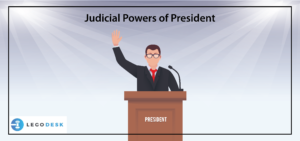Judicial Powers of President – You Don’t Know

The Office of the President is a creation of the Constitution. The precise nature of his office and powers have to be determined through a study of the relevant provisions of the Constitution. The Constitution also tells the readers whether all his powers are exercised by him in the same manner or the manner differs according to the particular power that has to be performed.
Read Also: Top 8 Powers of Prime Minister
The President has executive as well as judicial powers. This article will concern itself with the discussion of the judicial powers of the President.
Basic Judicial powers of The President
-
Preservation of Law:
The primary duty of the president is to preserve, protect, and defend the Constitution and the law of India as per Article 60.
-
Appointment of Judges
The President also appoints the Chief Justice and other judges on the advice of the Chief Justice. The same has been confirmed through the case of Union of India v Jyoti Parkash Mitter[1]. In this case, the Supreme Court had to construe Article 217(3) of the Constitution, which lays down that any question as to the age of the Judge of a High Court shall be decided by the President after consultation with the Chief Justice of India. In view of the great importance attached by the Constitution to the independence of the High Court judges, this provision was also construed to mean that the President personally must consider and decide the question as to the age of the Judge of a High Court.
Therefore, in this case, the function of the President to decide upon the age of a Judge of a High Court under Article 217(3) was held to be judicial. The Supreme Court observed:
“Normally, judicial power must be exercised by the authority in whom that power is vested. But under Article 217(3) power to decide the question as to the age of a Judge of the High Court has to be exercised after consultation with the Chief Justice of India.”
-
Removal of Judges
The President can also remove a Judge if both Houses of the Parliament, i.e. the Lok Sabha and the Rajya Sabha passed a resolution by a two-thirds majority to that effect.
-
Pardoning Power of the President
The President also has the power to pardon, reprieve, respite, remit, suspend or commute sentences of persons who have been convicted. This has been granted under Article 72 of the Indian Constitution. It is judicial in nature because such a power which deals with the commutation of punishment is only exercised by the Judiciary of the Indian State and not by the Executive or Legislature.
Power to pardon means that the President can set free any offender who has been tried and convicted, but the President personally felt could be set free. Power of reprieve means that the execution of the convicted person is stayed before considering him for a pardoning proceeding. Power to respite means that a lesser sentence is awarded to the convict than the punishment that was awarded in the first instance. Power to commute means a lighter punishment is given. These powers can only be exercised by the President on his own, without any consultation from anyone. Furthermore, these powers can also be exercised when the punishment is given by military courts. This is because the President also holds the position of the Supreme Commander of the Armed Forces.
In the case of Kuljeet Singh v Lt, Governor of Delhi, the Supreme Court held that the Pardoning Power of the President has to be examined under the facts and circumstances of every case. It cannot be exercised unnecessarily and has to be reviewed thoroughly. An undue exercise of this power is to be deplored.
-
Asking for Advice
The President can also seek the advice of the Supreme Court, under Article 143 of the Indian Constitution. This can be exercised when the President is posed with such a grave question of law that he himself cannot decide what to do. When a situation of public importance arises, this power can be exercised, and the advice of the Supreme Court can be sought.
Conclusion
We have examined the basic judicial powers of the President granted under the Indian Constitution. At first glance, it would seem that the President is fraught with a lot of powers and exercises due to judicial functions as well. But, when seen in its actual context, it becomes clear that the President is one member of the Executive with very little say in the functioning of the Government. In fact, he has negligible powers.
Apart from the power of pardon, every other power cannot be exercised by him solely. He has to always be in consultation with the Chief Justice or with his Council of Ministers. His hands are always tied. The appointment and removal of judges cannot be done until advice is sought or resolutions are passed. He has always been a sitting duck with close to no power in his hands.
[1] (1971) 1 SCC 396
Try our Debt Resolution solutions today Request a Demo